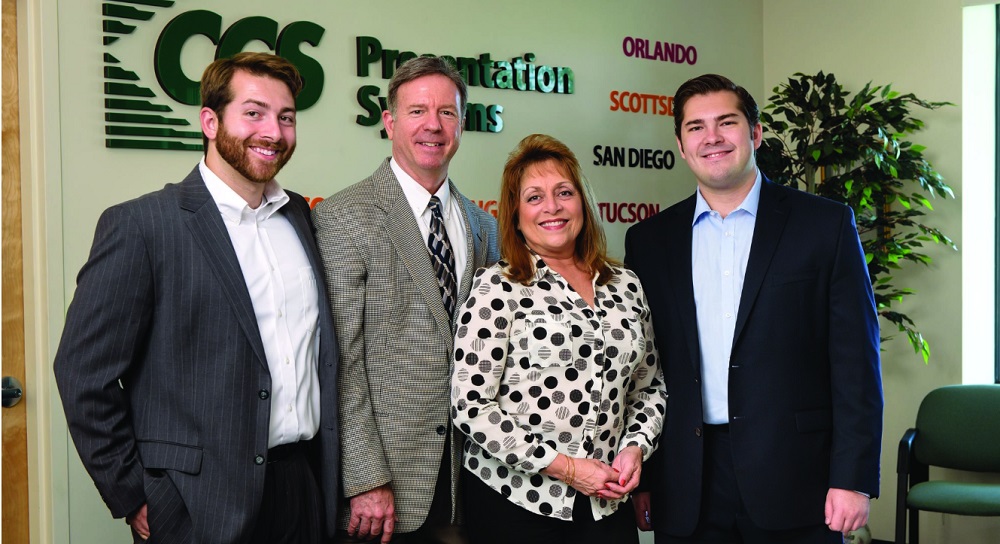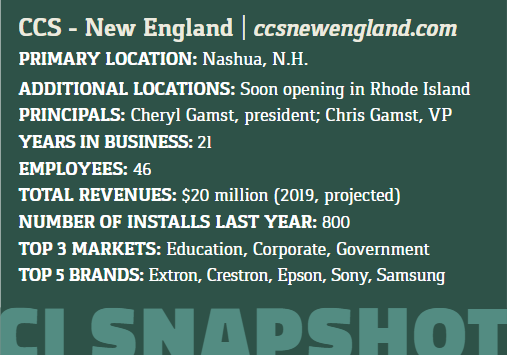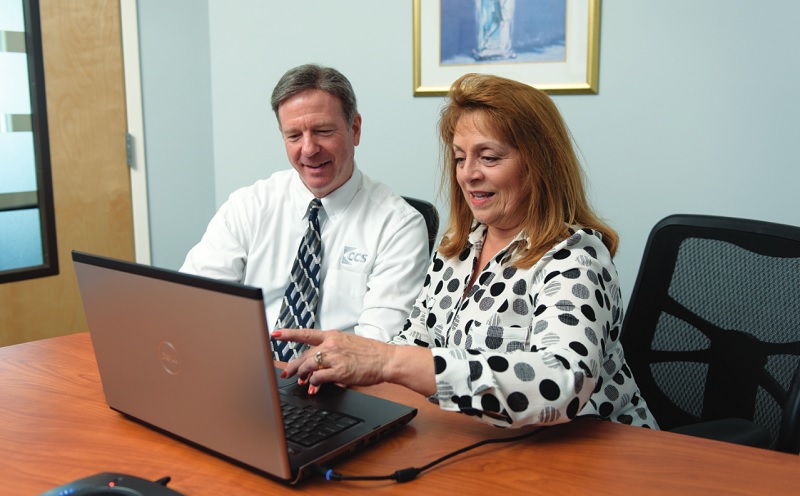If you’ve worked as an AV manufacturer’s sales rep, you know the deal — frequent traveling and being available to your customers 24/7. Back in the 1990s, before easy access to video conferencing and communication platforms — and before “work-life balance” was a thing — it was even more challenging.
When Chris Gamst worked for a projector manufacturer, he was on the road almost every week. “It was what was expected of the job,” he says, matter-of-factly. Those high expectations can take their toll on a father of, at that time, two young children.
He remembers the precise moment when he and wife Cheryl realized something had to change.
“Our son, Christian, who was 3 years old, was walking toward our front door with my briefcase in his hand,” Chris says. “We asked him where he was going and he said, ‘I’m going on a business trip.’”
There was something about that realization — that to their 3-year-old son, dad is the guy who is on his way out the door — that sprung Chris into action.
“I knew I had to make some career changes in order to have more family time.”
Chris had already been thinking about starting a business, and he wasn’t in it alone.
Cheryl, who had spent the last couple of years at home with the kids, previously had her own manufacturer’s rep business in another industry and boasted a strong marketing background.
Chris, meanwhile, brought sales and customer service talent, plus knowledge of the AV integration market.
Of course, the right leadership talent and an idea isn’t enough ammunition to start a business.
“A lot of people want to start a business,” Chris says, but getting the nerve up is a big challenge because there are a lot of risks. “We had a young family and I had a steady paycheck, and you can’t count on that when you’re starting a business. You have to come up with money.”
Since there was no obvious answer, the Gamsts’ reality of Cheryl at home with the kids while Chris was on the road for four or five days a week would continue — for the time being.
Taking the First Leap Towards CCS New England
When most people look back on their careers, they can identify key colleagues and conversations that helped them to pivot in the right (or wrong) direction. In Chris Gamst’s case, he was lucky to make an early connection with David Riberi when they worked together at a projector manufacturer.
They remained friends after Riberi left. During a conversation about Gamst’s business ambitions, Riberi talked about how he had launched a business as part of the CCS Presentation Systems network.
In fact, when Riberi launched CCS – California it became the first CCS licensee under the CCS Presentation Systems umbrella founded by CEO John Godbout out of CCS – Southwest in Arizona.
Godbout is clear that these are not “franchises.” Each partner owns his or her own business and can build and create equity through the relationship.
It was and is a unique setup within the commercial AV integration market.
Each of the partners under the CCS umbrella are tied to the parent company through a licensing agreement.
Godbout is clear that these are not “franchises.” Each partner owns his or her own business and can build and create equity through the relationship.
Riberi, who since departed CCS in 2017 to co-found LightWerks Communication Systems, sold Gamst on the value of being a CCS licensee.
He explained that “all the product lines, all the manufacturers that I would have to sign up individually were all set up,” Chris recalls. “He said that [Godbout] helped him get the business started with fellow manufacturers and offered valuable business advice.”
It sounded like the type of jumpstart the Gamsts needed, and Riberi felt comfortable setting up a meeting with Godbout. “I had known Chris for a long time and I knew him to be a proverbial ‘good guy’ — honest, hard-working, and really friendly,” Riberi says.
“Combined with his sales experience in the industry and his desire to be an entrepreneur, I thought he and Cheryl would be an excellent fit with CCS, with John and Beth Godbout. And Chris is one of the funniest guys I’ve ever known, so who wouldn’t want to partner up with someone like that?”
It didn’t take long for Chris and Godbout to connect at an InfoComm event, but it wasn’t ideal. “It was loud and it was difficult talking,” Chris recalls.
It seemed like an opportunity lost and the Gamsts went back to business as usual. However, Riberi worked to set up another, more productive meeting between Chris and Godbout. This one was a year in the making but the extra time probably paid dividends.
Meeting No. 2 also took place at InfoComm, but this time in a hotel lobby. The Gamsts spent a lot of time preparing for Chris’ presentation. “Cheryl helped me put together sales projections and a business plan,” he says.
Then came the meeting. Chris sat down with John in the lobby of the hotel and handed him the detailed business plan. “He looked at it for I think three or four seconds and said, ‘Well, that’s nice. I know you spent a lot of time on this, but I’ve already vetted you.”
Godbout recalls that meeting, too. While the response might have seemed curt it was anything but.
“The initial qualification was based on my contacting other integrators, manufacturing reps and just about anyone who had knowledge of the prospect,” he says. “Chris and Cheryl received strong reviews by their peers and customers.”
Read Next: One System by CCS Presentation Controls All the AV in Lenexa City Center
Meanwhile, he was pleased that the Gamsts had been recommended by an existing partner. The New England-based couple also wanted to become partners in a geographic territory that was desirable to the partnership.
“It has been said that you like someone within seconds of meeting them, and Chris and Cheryl passed the ‘John test’ immediately,” Godbout says.
However, the “John test” isn’t the final exam. Chris recalls Godbout emphasizing the importance of CCS’s reputation and how selective it is to sign a licensee. Licensees had to have the same ethics and values as Godbout, his wife and the other CCS partners.
It wasn’t long before Cheryl and Chris flew out to meet and have dinner with John and Beth Godbout. “He called us within a day or two and said, ‘Okay, you passed the ‘Beth test.’ You’re in. I’ll send you a licensee agreement.”
A Family Takes a Risk
While it was a great step forward to earn the Godbouts’ endorsement as a CCS licensee, the Gamsts didn’t have the luxury of glossing over the next step — raising money to start the business. “All the expenses are out of our pocket,” Chris says.
That is partially a reflection of CCS being a licensee partnership as opposed a franchise structure. “It’s different,” Chris says. “It gives us more control of day-to-day business handling.”
Essentially, CCS partner licensees are held together by that license agreement that “requires a very small percentage of the revenue to be paid to CCS – Arizona,” Godbout explains.
“Without disclosing the exact amount, a partner’s License Fee has never been more than the VIR/MDF benefits they receive as a CCS Partner. Basically, all the agreement requires is to protect the reputation of CCS and be good industry citizens.”
Still, just like starting any business, it requires capital.
The Gamsts had to get creative and sold their house, laying out a fixed amount of cash flow that the family of four would live on for the next two years. “We didn’t take a paycheck during that time,” Chris says.
It was a risk, but Cheryl was all in. “It was a dream Chris and I had for years. When we got this opportunity to become a licensee of CCS we were going to find a way to make it work.
“It started with selling the house, but also making other changes to make sure we were supporting ourselves,” she says. “We found a way.”
The other investment that the Gamsts made Chris describes as “sweat equity.” Grandparents stepped up to watch the kids so Cheryl could work on the business.
Chris recalls being at the office seven days a week in the early years.
As hard as the Gamsts worked to get the business up and running during those early years, the CCS structure provided them with invaluable support.
Indeed, “it was our business, the way we wanted to handle it and [Godbout] really didn’t interfere with that,” Chris says.
“But he’s there to guide us and give us advice, and that’s one of the nice things about the whole CCS setup. There are 12 owners [of licensee companies] and it’s like having 12 consultants.”
Godbout has built that type of collaboration into the CCS New England structure, instituting monthly partner conference calls, bi-yearly partner meetings and occasional bi-yearly trips to destinations such as Ireland, New York, Scotland, the Caribbean, and Bora Bora. “
We also formed a company, CCS Global, in which we share resources, bonding, health care, marketing, etc.,” Godbout adds.
“Each partner owns a portion and shares in the resources. The majority of the partners use the same accounting system, realizing the benefits and the pitfalls of it — but regardless we all understand the benefits of having similar information. It would be uncommon for any of the 12 partners to not communicate either by phone or email each week.”
The built-in support and structure were beneficial to the young business owners. “We didn’t have to recreate the wheel. That was very appealing to us,” Chris says.
Why CCS New England Continues to Grow
CCS New England is investing in its growth. It has plans to open a second facility in Rhode Island and it will expand its Nashua headquarters.
The company owns its building but had been leasing a section of it. With staff facilities needs increasing, CCS New England intends to take over the entire building once the tenant’s lease it up. “I don’t have any more space for support staff and we do need more,” Cheryl says. “We’re at that point.”
Meanwhile, both Chris and Cheryl are wary of the perils of growing too quickly. “We’ve had some pretty significant growth, almost doubling the size of our business over the last couple of years, and it’s tough to adjust to that,” Chris says.
“When we got this opportunity to become a licensee of CCS we were going to find a way to make it work,” says Cheryl Gamst. “It started with selling the house, but also making other changes to make sure we were supporting ourselves.”
Cheryl aims to make sure that the company takes a measured approach to growth — but she realizes that’s a significant challenge.
“We’re really focused on making sure that we’re efficient, and that takes work with the additional staff that we’ve brought on. So that’s the goal that we have, maintaining efficiencies.”
Another goal that CCS New England has is to maintain its identity as a family business.
That doesn’t just mean providing a pathway for the Gamsts’ two sons already working in the business (including Christian who as noted, in a way, catalyzed the launch of CCS New England over two decades ago).
The Gamsts are proud of their extended family of employees. “We have many five-plus and 10-plus-year employees,” Cheryl says. “We have an employee who has been with us for almost 21 years. We celebrate that.”
Along those lines, CCS New England tries to provide a modern work environment that supports its employees’ work-life needs. “We do flex hours; we have some people that work from home if their job allows that,” Chris says.
The Gamsts also offer incentives to employees who can brainstorm measurable ways to save the company money. There are occasional rewards for high-performing employees, including access to the Gamsts’ time-share.
“We want to keep good employees with us. We try to create a nice atmosphere so that they want to come to work and want to work hard for us.”
That’s a little bit different than the “sweat equity” that Chris and Cheryl Gamst put into CCS New England in the early days. In both cases, though, the hard work is rewarded.
So You Want to Be a CCS Licensee …
Although Chris and Cheryl Gamst’s success story with CCS New England might make it look easy, there were three essential elements at play:
CCS – Arizona founder and CEO John Godbout had to put together a business strategy that would make a unique licensee partnership network have a chance to succeed.
It takes quality people and managers to lead the individual CCS licensee companies.
“Each partner owns a portion and shares in the resources,” says CCS – Arizona founder and CEO John Godbout
Those quality people need to treat it like starting a business, because that’s exactly what they’re doing.
And they need to invest the “sweat equity,” in Chris’ words, that the Gamsts were willing to deliver.
The whole concept started when a rep from a manufacturer that Godbout’s CCS – Arizona worked with talked to him about his career ambitious.
“He wanted to become an integrator but lacked the financing and juice to put it together,” Godbout recalls.
“He and I created a concept that would provide him the necessary funding and support what was needed. Other manufacturing reps saw his success and become interested. I was also interested in growing the idea and accepted every inquiry as a potential CCS partner.”
All those inquiries, of course, don’t turn into business partnerships. In the case of the Gamsts, Godbout put in the legwork interviewing integration firms, manufacturer’s reps and just about anybody he could find who had interacted with them.
Even once he was convinced of their business credentials, he spent more time getting to know them on a personal level to make sure they’d reflect the ethics and reputation of CCS.
From a strategic business perspective, CCS New England offered particular appeal. “They wanted to become partners in a geographic territory that was desirable to the partnership,” Godbout says. “We’re always looking for partners like Chris and Cheryl.”



















